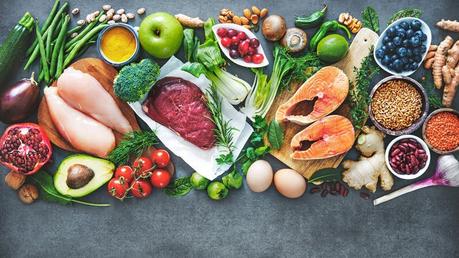3. Intermittent fasting
Intermittent fasting basics
Intermittent fasting involves going for extended periods without eating. It includes time-restricted eating (skipping one or two meals every day) and alternate-day-fasting (eating normally one day and fasting or eating very few calories the next day).
Unlike other weight loss plans, intermittent fasting specifies when you eat rather than what you eat.
Weight loss
Reviews of studies exploring time-restricted eating and alternate-day fasting have shown that they are as effective or more effective than daily calorie restriction for losing fat and improving health markers.
One review of clinical trials found that while alternate-day fasting or chronic calorie restriction led to similar weight and fat loss, people who practiced alternate-day fasting retained more muscle mass than those who ate a low-calorie diet every day.
Health benefits
A 2019 review of trials found that intermittent fasting lowered blood sugar and increased insulin sensitivity compared to control diets.
In one trial, people with type 2 diabetes who practiced intermittent fasting for 12 months improved their blood sugar control as much as people who followed calorie-restricted diets.
One problem with intermittent fasting trials is that people are usually advised to eat whatever they want during non-fasting periods - which could include processed foods high in sugar and other refined carbs.
Regardless of how often you eat, getting adequate essential nutrition - especially protein - and limiting less nutritious foods is important for sustainable weight loss and overall health.
If you are going to practice intermittent fasting, choose nourishing, minimally processed foods whenever you eat.
Pros
Cons
- For some, it may be difficult to fast for several hours or eat few to no calories on alternate days
- May cause some side effects
- Requires medical supervision in people who take medications for diabetes or blood pressure
Rating
To learn more about time-restricted eating and alternate-day fasting, read our intermittent fasting for beginners guide.
4. Mediterranean diet

Mediterranean diet basics
A "Mediterranean diet" is a way of eating based on the traditional cuisine of people living in the countries that border the Mediterranean Sea, including Italy and Greece.
Many people consider a Mediterranean diet healthy because the most common version features large amounts of vegetables, fruits, whole grains, fish, legumes, nuts, and olive oil, with moderate amounts of meat, eggs, dairy, and alcohol.
Weight loss
One review comparing different diets found that a Mediterranean diet can provide modest weight loss benefits in people with type 2 diabetes.
Occasionally, this way of eating may also produce rapid results. For example, in one study, people who followed a Mediterranean diet lost up to 7.5 pounds (3.4 kilos) and 2.74% of their body fat in only four weeks.
Researchers who reviewed several trials testing different diets found that a Mediterranean diet was more effective than low-fat diets for losing weight but not more effective than low-carb diets for losing weight.
Indeed, low-carb versions of Mediterranean diets typically lead to more impressive weight loss results compared to low-fat diets and traditional Mediterranean diets.
Low-carb versions of Mediterranean diets typically lead to more impressive weight loss results compared to low-fat diets and traditional Mediterranean diets.
Health benefits
In 2015, researchers who conducted a sweeping review of Mediterranean diet trials in people with type 2 diabetes found that they are more effective for lowering blood sugar, HbA1c, and reducing heart disease risk factors than low-fat diets.
Results from a two-year trial suggest that losing weight by following a Mediterranean diet can potentially help reduce the amount of plaque on artery walls in people with heart disease.
Pros
Cons
Rating
To learn more about how to follow a Mediterranean diet, read The Mediterranean Diet for Beginners.
5. Paleo diet
Paleo diet basics
A paleo or paleolithic diet - also known as the hunter-gatherer diet, caveman diet, and stone-age diet - includes only foods that could have been eaten by our prehistoric ancestors who lived roughly 10,000 to 2 million years ago.
On a paleo diet, you avoid not only processed foods, refined flour, and sugar, but also whole grains, dairy products, and legumes. Foods to eat include meat, fish, fruit, vegetables, tubers (potatoes and yams), nuts, and seeds.
A modern-day paleo lifestyle gained fame and popularity through the writings of exercise physiologist Loren Cordain in his best-selling 2002 book, The Paleo Diet.
This way of eating focuses on getting back to natural foods to improve and prevent metabolic disease.
Weight loss
In 2019, researchers reported that in nine of eleven trials, people who ate a paleo diet lost more weight than people who ate their usual diets or diets recommended by health authorities.
In a 12-week trial, people with type 2 diabetes ate a non-calorie-restricted paleo diet while following standard exercise recommendations or participating in supervised one-hour exercise sessions three times a week. By the end of the study, both groups lost nearly 16 pounds (7.1 kilos) and decreased their HbA1c by about 1%.
Other trials have shown more modest weight loss results in people who ate paleo diets.
Health benefits
In some trials, people who followed paleo diets had greater improvements in blood sugar, insulin sensitivity, and triglyceride levels compared to those who followed other diets.
Because the paleo diet provides a wide variety of animal and plant foods, people who follow this way of eating are unlikely to develop nutrient deficiencies. A possible exception may be calcium deficiency due to avoiding dairy.
However, you can meet your calcium needs on a paleo diet by including non-dairy sources of calcium, such as canned salmon or sardines, almonds, seeds, and leafy green vegetables.
Additionally, some people may fall short on iodine because iodized salt is typically not permitted on paleo diets. Fortunately, consuming fish and shellfish regularly can help prevent iodine deficiency.
Pros
Cons
Rating
To learn more about how to follow a paleo diet, read our full guide.
6. Vegan diet
Vegan diet basics
On a vegan diet, all animal products are off the table. This means avoiding eggs, meat, fish, dairy products, and gelatin (which comes from animal bones and hides). Vegan staples include legumes, grains, nuts, seeds, vegetables, and fruits.
Both vegan and plant-based diets have become very popular in recent years. Although people sometimes use these terms interchangeably, they mean different things. Unlike vegan diets, plant-based diets may include small amounts of animal products.
Weight loss
Overall, vegan diets have been shown to produce slightly better weight loss than standard dietary advice in overweight people and those with type 2 diabetes.
In some studies, people have lost significantly more weight with a vegan approach compared to other higher-carb diets.
In a recent 16-week trial, 122 overweight adults who ate a low-fat vegan diet lost an average of nearly 14 pounds (6.4 kilos), reduced their body fat by 10%, and became more insulin sensitive. Although they were allowed to eat as much as they wanted, they ended up averaging 500 fewer calories per day than their baseline diet.
In some studies, people have lost significantly more weight with a vegan approach compared to other higher-carb diets.
One six-month trial that compared different types of non-calorie-restricted plant-based diets found that participants who ate vegan diets lost more weight than those who ate vegetarian and semi-vegetarian diets.
A low-carb vegan diet combines two popular eating patterns. Although only one study has explored this approach, results suggest that it may help some people lose weight and improve heart health markers.
Health benefits
In some but not all studies, vegan diets have been shown to reduce blood sugar and insulin levels, along with markers of heart disease risk.
A vegan diet requires supplementation with vitamin B12, which is only found in animal products. Additionally, people who eat a vegan diet are at higher risk of protein, vitamin D, calcium, iron, and zinc deficiencies.
To stay healthy on a vegan diet, it's crucial to include a protein source (legumes, nuts, seeds) and vegetables at every meal and to take supplements as needed based on lab results.
Pros
Cons
Rating
To learn more about vegan diets, read Vegan for Life.
If you're interested in following a low-carb version of a vegan diet, read our full guide.
7. Vegetarian diet
Vegetarian diet basics
Vegetarian diets exclude meat but - with the exception of vegan diets - include some animal products. Lacto-ovo vegetarians eat dairy and eggs, lacto vegetarians eat dairy but avoid eggs, and pescatarians eat seafood, eggs, and dairy.
Like vegan diets, vegetarian diets are typically rich in legumes, grains, and vegetables. Although many highly processed foods are technically vegetarian, health-focused vegetarians recommend avoiding them.
Weight loss
Reviews of vegetarian diet trials suggest that this way of eating may help some people lose weight.
However, vegetarian diets haven't been shown to be more effective than other diets for weight loss, at least long term.
In one review of 12 trials, people who ate vegetarian diets initially lost an average of 4.4 pounds (2.2 kilos) more than those who ate meat-containing higher-carb diets, and the largest weight loss occurred in those who ate vegan or calorie-restricted vegetarian diets. Yet in trials lasting a year or more, weight loss was similar between those eating vegetarian vs. non-vegetarian diets.
Health benefits
Similarly, vegetarian diets may not improve all heart health markers more than diets that include meat.
For example, in one trial, 118 overweight adults followed a calorie-restricted vegetarian diet and a calorie-restricted Mediterranean diet for three months and lost about 4 pounds (1.8 kilos) during each diet. Although the vegetarian diet lowered their LDL cholesterol more, the Mediterranean diet lowered their triglyceride levels more.
Pros
Cons
Rating
To learn more about losing weight while following a vegetarian lifestyle, check out the Vegetarian for Weight Loss cookbook.
If you are interested in a diet that combines a vegetarian diet with a keto approach, read our full guide.
8. DASH diet
DASH diet basics
The Dietary Approaches to Stop Hypertension (DASH) diet is designed to lower blood pressure.
It emphasizes minimally processed foods high in potassium and other minerals, such as fruits, vegetables, whole grains, lean protein, and low-fat dairy products. The DASH diet limits sugar and saturated fat, and most versions restrict sodium.
Weight loss
Although the DASH diet's primary focus is lowering blood pressure to decrease heart disease and stroke risk, some research suggests it may help people lose weight, especially when combined with calorie restriction.
For instance, one review of 13 trials found that the DASH diet led to slightly greater weight loss when compared to control diets.
In an eight-week trial in people with fatty liver disease, participants who ate a calorie-restricted DASH diet lost 8 pounds (4.8 kilos), while those who ate a calorie-restricted control diet lost 5 pounds (2.3 kilos).
Health benefits
The DASH diet may improve some health markers.
In the eight-week trial described above, the DASH diet group had greater improvements in liver enzymes, insulin sensitivity, triglycerides, and markers of inflammation compared to the control group.
The DASH diet seems to live up to its name. A 2020 review of 50 trials found that the DASH diet slightly lowered blood pressure compared to control diets. Interestingly, the DASH diet reduced blood pressure the most when sodium intake was not restricted to less than 2,400 mg per day.
Interestingly, the DASH diet reduced blood pressure the most when sodium intake was not restricted to less than 2,400 mg per day.
Pros
Cons
Rating
For a weight-loss-focused version of the DASH diet, read The DASH diet weight loss solution.
9. WW (formerly Weight Watchers)

WW basics
WW - known as Weight Watchers until 2018 - is a diet program that assigns point values, called SmartPoints, to foods based on their calorie and nutritional content.
Although a food's calories form the basis of its point value, saturated fat and sugar increase the number, while protein lowers it.
Many fruits, vegetables, legumes, and lean proteins are assigned a point value of zero to encourage people to eat as much as they want of these foods. Depending on the eating plan a person chooses, they can eat other foods totaling up to 100, 200, or 300 points per day.
Weight loss
While there isn't a lot of research on the WW points system for weight loss, a few trials suggest that it may work for some people.
In a 2016 trial, adults with prediabetes who followed the WW points plan lost 5.5% of their body weight within 12 months, compared to a 0.2% loss in those who followed a diet based on the National Diabetes Education Program guidelines.
In a study of 297 overweight adults, those who followed the Weight Watchers online program lost 6 pounds (2.7 kilos) within three months, while those who received a WW newsletter but did not join the program lost 3 pounds (1.3 kilos).
In the 2005 A to Z trial, people who were assigned to the Weight Watchers program lost about 7 pounds (3 kilos) in one year, which was similar to participants who were assigned to the Atkins, Ornish (low-fat, plant based), or Zone (high-protein) diet.
Health benefits
Although studies on the WW program have focused on changes in weight, some have also reported improvements in health markers.
In the 2016 trial in people with prediabetes described above, those who followed WW reduced their HbA1c values and increased their HDL cholesterol levels more than those who followed standard diabetes recommendations.
And in the 2005 A to Z trial, participants in the Weight Watchers group experienced slight reductions in LDL cholesterol levels, similar to those in the Atkins, Ornish, and Zone groups.
Pros
Cons
Rating
To learn more about the WW online program, visit the WW site.
10. Zone diet

Zone diet basics
The Zone diet was created by Dr. Barry Sears, who published his best-selling book Enter the Zone in 1995.
It involves eating a specific macronutrient ratio - 40% carbs, 30% protein, and 30% fat - at each meal.
The diet also emphasizes choosing low-glycemic-index carbohydrates (vegetables, sweet potatoes, apples), lean proteins (chicken breast, fish, egg whites), and unsaturated fats (olive oil, nuts).
To achieve the 40/30/30 macronutrient ratio, people eat Zone "blocks" that contain 7 grams of protein, 9 grams of carbs, and 1.5 grams of fat. Zone dieters are assigned a daily quota of blocks based on their weight and body composition.
Weight loss
There has been very little published research on the Zone diet's effects on weight and health to date.
In a small study, Italian researchers reported that participants who followed the Zone diet supplemented with omega-3 fatty acids lost more body fat than those who followed standard dietary recommendations with omega-3 fatty acid supplementation.
In a six-month trial of 96 overweight women, participants who followed a non-calorie-restricted Zone diet lost 15 pounds (6.7 kilos), which was slightly less than those who followed the Atkins diet and significantly more than those who followed a high-carb, high-fiber diet.
In some trials, the Zone diet hasn't been found as effective for weight loss as other diets. For instance, in the 2007 A to Z trial, overweight women assigned to follow the Zone diet lost significantly less weight than those assigned to the Atkins diet, and slightly less weight than those assigned to the Ornish diet or LEARN (low fat) diet.
Health benefits
Limited research suggests the Zone diet might improve some health markers. For instance, in a 2005 trial, people who followed the Zone diet or Atkins diet had greater reductions in triglycerides than those who ate a high-carb, high-fiber diet diet.
Pros
Cons
Rating
To learn more about the diet, read Enter the Zone.
Summary
You can lose weight in many different ways. While some diets seem to be more effective for taking off pounds or kilos than others, there isn't one diet plan that is best for everyone.
All of the diets on this list emphasize choosing minimally processed, nutritious foods and avoiding refined flour and sugar.
When you eliminate refined carbs, you get rid of many foods that cause people to gain weight.
The best diet plan for you is the one that allows the foods you love, helps you feel full and satisfied, and improves your health markers. If you struggle to stay true to a specific way of eating and constantly crave "forbidden" foods, the diet likely won't be sustainable for you.
When you find a way of eating that you can enjoy as a lifestyle for years to come, you'll be on your way to losing weight and keeping it off for good.

